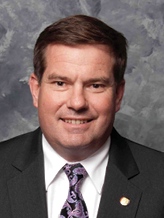The National Ready Mixed Concrete Association has enrolled 29 emerging operations, sales and technical or engineering professionals from 19 producer and associate member companies in the 2023 Developing Industry Leaders (DIL) program. This year’s class represents 21 states, notes NRMCA Vice President, Education Eileen Dickson, who serves as chief staff liaison to the Workforce Development Committee, DIL administrator. The program affords participants insight into critical factors on national and strategic levels, along with the opportunity to work on a diverse team with peers from across the country. DIL alumni and senior NRMCA staff serve as mentors.

Charles Pankow Foundation directors have appointed Colonel Stuart Harrison, P.E., CFM, F.SAME, USA (retired) as the organization’s new executive director. Currently president of FaciliTech LLC, a Virginia-based consultancy for the built environment, he retired from the U.S. Army Corps of Engineers in 2008 and has held executive positions with architecture, engineering, and construction companies. Interim Executive Director Mark Perniconi, P.E. is assisting in the transition.
Now in its 18th year, the Pankow Foundation leads industry collaborations, funds research and projects, and delivers solutions that enable AEC interests to advance innovation in building design and delivery.
Under a new memorandum of understanding, the Slag Cement Association and NEU, an ACI Center of Excellence for Carbon Neutral Concrete pledge to use their individual and collective resources to reduce, through reasonable measures, the carbon footprint of concrete in the built environment. SCA will share technical information about the utilization of slag cement in lower embodied concrete construction. NEU will incorporate such knowledge into its publications and educational resources, fostering widespread awareness of the role of slag cement in reducing slabs’ and structures’ carbon impact.
“As an Allied Organization of NEU, the Slag Cement Association is uniquely positioned to assist in the reduction of the concrete industry’s carbon footprint,” says SCA Marketing Director Nick Brimley. “NEU will now be able to utilize and promote our many technical and education resources, such as case studies, webinars, and Life Cycle Assessment Calculator.”
“We look forward to working with the Slag Cement Association in promoting our similar missions and advancing materials and technologies that can assist in reducing carbon dioxide emissions associated with concrete construction,” adds NEU Executive Director Dean Frank, P.E.
ACI FOUNDATION RESEARCH GRANTS
The ACI Foundation’s Concrete Research Council will fund 11 projects for 2023, its selections based on criteria including relevancy and potential impact of outcomes; supplemental support for the project such as collaboration with other funders and organizations; overall proposal quality; researcher capability; and, ACI Technical Committee engagement. Among projects and their leaders or principal investigators are:
- Alternative End-Specimen Conditions to Characterize Compressive Strength of Ultra-High-Performance Concretes; Kinsey Skillen, Texas A&M University
- Direct Tension Test Results and In-Situ Response in Reinforced UHPC Beams: Relationship and Design Implications; Sherif El-Tawil, University of Michigan
- Nano-Modified Calcined Clay-Based Cement Concrete: A High Modulus Concrete with Low Carbon Footprint; Panagiotis Danoglidis, University of Texas, Arlington
- Insulating Concrete Form Wall Construction Meeting the Requirements of NFPA 285 – Phase II; Shamim Rashid-Sumar, National Ready Mixed Concrete Association and Douglas Bennion, Quadlock
- Sustainable and Safe Reinforced Concrete Retaining Walls; Luis Fargier-Gabaldon, University of Notre Dame
- Rheological Behavior of Fresh Ultra-High-Performance Concrete Enhanced by Nano-Additives and Data-Driven Approaches; Chengcheng Tao, Purdue University and Kamal Khayat, Missouri University of Science and Technology
The ACI Foundation is committed to industry progress, contributing financially to necessary and worthy research. The Concrete Research Council seeks projects that further the knowledge and sustainability of materials, construction, and structures in coordination with ACI Technical Committees. Additional information about each of this year’s awarded projects—including funding partners, research team, ACI committee involvement and baseline details—is available at www.ACIFoundation.org/research.